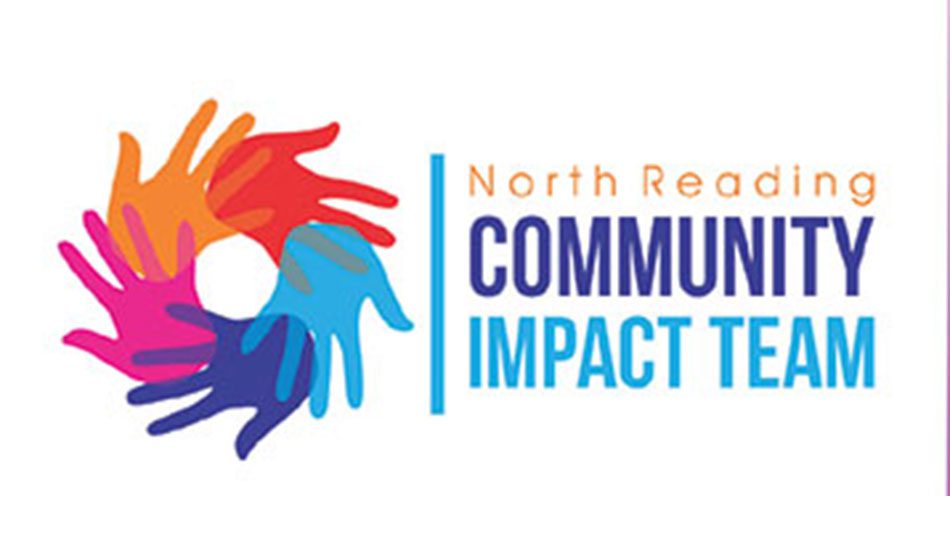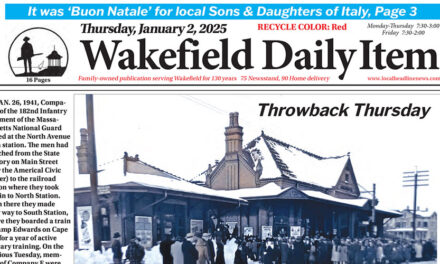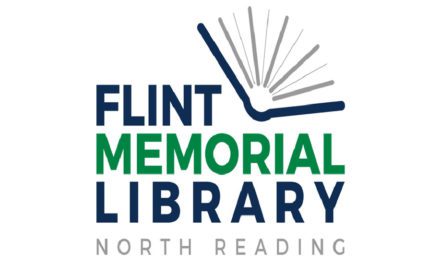Making An Impact is a column authored by members of the Community Impact Team (CIT). The Transcript publishes these articles periodically to inform our readers about the resources and programming available to people of all ages in our community through the CIT’s efforts.
NORTH READING — “We call it the ‘Tripod Model,’” said North Reading Drug-Free Communities Director Amy Luckiewicz. “We need a better name!”
It’s a model being studied as a potential best practice for towns and cities that are looking to integrate whole services to those with Substance Use Disorder and/or mental health challenges. But the North Reading Youth Substance Use Prevention Coalition has been innovating the model since October 2018.
Luckiewicz explained, “Our town has had a federal grant to reduce and prevent youth substance use since 2016 through a coalition of volunteers. For a year, we operated the grant independently of other town departments. It wasn’t until 2017 when it was moved into the police department at Chief Murphy’s request.”
A year later, Chief Michael Murphy and Luckiewicz met to discuss gaps in the prevention program and how the police department could address those gaps. “It was an easy answer. Our officers were doing a great job after a crisis, but we needed someone full-time to address accessing resources to mental health and substance use treatment,” Luckiewicz said.
After a lengthy review of positions in nearby towns, budget development and approval at Town Meeting, the police department hired Substance Use and Mental Health Clinician Laura Miranda full-time in 2018. “Bringing Laura on was a game changer for our team,” Luckiewicz noted. “When you have a full-time prevention person in the same ‘house’ as a full-time clinician alongside enforcement officers, we saw a huge jump in outcomes.” Specifically, sharing information about local trends, intelligence from federal drug agencies, partnering with the School Resource Officer Detective Paul Lucci, and pro-active outreach to families was enhanced.
“What makes our model unique is that typically staff in my position or Laura’s are housed in public health or schools,” Luckiewicz said, adding, “Yes, we still connect with those departments and work with them regularly through the Community Impact Team. But being physically in the police department has just made the communication so much more fluid and rapid.”
In fact, in February 2023, Detective Lucci and Luckiewicz were invited to present the model to other federally funded grant recipients at the Community Anti-drug Coalitions of America’s National Leadership Forum in Washington, D.C. The post-event feedback surveys were outstanding. “It was great because we had preventionists, clinicians and law enforcement in attendance,” Det. Lucci noted. “A few commented that our model opened them up to partnering more with law enforcement. Law enforcement participants also said they saw a new avenue to let prevention coalitions into their world.”
In addition, the Tripod Model is offered to the North Reading community as a resource for substance education. Detective Lucci, Luckiewicz, and Miranda will meet with community members of all ages, to encourage education around substances. Luckiewicz discusses facts about the substance of choice and engages the participant (often youth) in myth-busting the substance, to foster learning and promote educated decision-making.
Miranda discusses the mental health repercussions of the substance use and the likelihood of exacerbating mental health concerns due to continued use of the substance. Miranda always offers treatment resources in the conversation, with the acknowledgement that if the participant is not ready today, she is available going forward for a future connection.
Detective Lucci discusses the potential short- and long-term legal implications of use of the substance, as well as presents information on topics such as the town’s social host ordinance and Good Samaritan laws. Tripod meetings are available to all ages within the community, although families seeking support for young people most often utilize such meetings. The young person can opt to have their family present for the meeting, or meet with the Tripod on their own.
What’s next for the team? “We regularly look at gaps in services. In the future, I think we need to consider making our tripod a square,” Luckiewicz said, explaining, “I could see a fourth team member helping serve people with ongoing substance challenges as a peer support specialist or recovery coach.”
The Tripod Model is ever evolving and open to continued resources that support the education of the North Reading community.
To join the Coalition or to learn more, send an email to: coalition@northreadingma.gov or call 978-357-5054.





